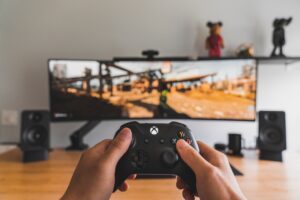Gaming is an exciting and integral part of many people’s lives but when does a hobby cross the line and become an addiction?
Uncontrolled video gaming can cause problems in a person’s relationships, academics, occupation, or daily life. Some people become so engrossed in gaming that they ignore normal activities. Despite experiencing negative consequences, their use of video games escalates.
What can you do if you are concerned about yourself, your child, or loved one’s use of video games?
- Understand how a gaming addiction is defined and what it looks like when someone is battling a gaming addiction.
- Talk with a therapist at SureHope Counseling and Training Center, to develop a plan to regain balance in the face of a gaming addiction.
How is a gaming disorder defined?
Gaming addiction can be identified (in part) by a person’s inability to control gaming habits despite negative consequences, or efforts to stop.
When addiction is present, gaming takes precedence over other interests and daily activities with an escalation of use despite negative consequences. The behavior pattern is severe enough to result in substantial impairment in personal, family, social, educational, and/or occupational areas in the addict’s life.
A behavioral or addiction specialist can help you determine if the use of video games is a hobby or has become an addiction.
Signs and symptoms of a gaming addiction
What does it look like when a person is struggling with a gaming addiction?
The Cleveland Clinic outlines signs and symptoms of video game addiction that help understand how a gaming addiction impacts someone’s life. Here are a few of the signs that may be present:
- Continuing to play video games even though the person knows it is causing problems including a poor performance at school, work, or with household responsibilities
- Experiencing irritability, anxiety, or anger when gaming isn’t possible or if games are taken away
- Finding the need to spend more and more time playing games to experience the same level of satisfaction
- Forgoing other activities or social relationships that were previously enjoyed to spend more time playing video games
- Inability to reduce playing time or quit gaming despite attempts to control the behavior
- Lying about time spent playing video games
- Inattention to personal hygiene as a result of excessive time spent gaming
- Using video games to avoid stress or relieve negative moods including guilt and hopelessness
Treating gaming addiction
Addressing gaming addiction in teens and adults looks different for each person. The NIH notes a common way to treat gaming addiction is through cognitive behavioral therapy. This is also known as “talk therapy.”
Daniel Pak, LCMHCA (NC), LPC (IL), NCC provides therapy for people facing gaming addiction. His work helps people find a healthy balance of video game use in their life. He also offers guidance for parents and friends who may be concerned about someone in their life struggling with a gaming addiction.
Regain balance in the face of a gaming addiction
When someone struggles with a gaming addiction they may also experience depression or anxiety, brain changes, or feelings of guilt or hopelessness.
However, finding a balance between playing time and other aspects of life can unfold into:
- strengthened relationships
- a leveling of moods
- more time for other activities that the person also enjoys
Reach out for help
If you are concerned about your child or a loved one’s use of video games please reach out to us. Our game addiction specialist, Daniel Pak, LCMHCA (NC), LPC (IL), NCC is passionate about creating a balance between virtuality and reality.
Please contact us to discuss the support and treatment options available to you or your loved one.

